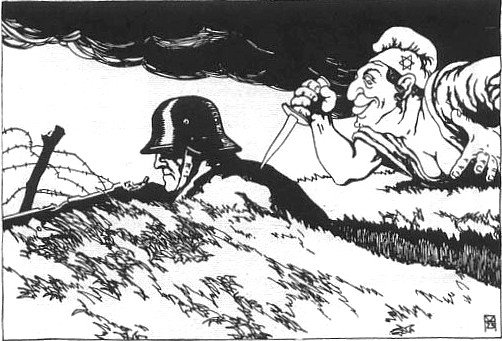Many people know General Erich Ludendorff as one of the main antagonists in the film Wonder Woman. He was portrayed as being ruthless and sadistic, not just to his foes but also to his own German colleagues and subordinates. Ludendorff romanticises war and claims that it betters humanity, leading to Diana Prince even believing him to be the literal God of War. However, the movie ends on a positive note, with Ludendorff and the God of War himself being defeated by Diana, leading to the end of World War I.
The reality, however, is more sobering. After the end of the war, Ludendorff returned to Germany where he became the forefront architect of what’s now known as the “stab-in-the-back myth”. In essence it was a theory that blamed Germany’s defeat in World War I on striking workers and Revolutionary Republicans at home. It advanced the claim that Germany could have won the war militarily, but was forced into a humiliating treaty by a backstabbing, traitorous civilian leadership backed by perfidious communists and Jews. The myth was soon picked up by right wing newspapers and political groups, and was even touted by a Weimar government investigation in 1919 as the official reason for Germany’s defeat.

Rather obviously, this notion was firmly divested from reality. German forces had attempted a last-ditch offensive in the Western Front in early 1918, only to be forced to a standstill by June. From August till October, the German front line was decisively penetrated during the Hundred Days Offensive, which ultimately compelled the German leadership to end the war. Even though the Allies hadn’t reached Germany proper (the German front line was in France and Belgium, as seen above), the German army was in a headlong retreat. On the home front, the British naval blockade of Germany had led to shortages in necessary staples such as grain, potatoes and meat, leading to widespread civilian malnutrition and riots. Bearing these facts in mind, it is hard to imagine a scenario where Germany would have been able to win the war even if revolution and labor strikes had not taken place.
For men like Ludendorff, however, the stab-in-the-back myth was perfect, due to the immense power that they held during the war. In 1916, General Erich von Falkenhayn was sacked as Chief of the German General Staff, and was replaced by Field Marshal Paul von Hindenberg and Ludendorff. In theory, the Hindenberg-Ludendorff duo reported to the Kaiser and could be checked on by the civilian Reichstag, or parliament. However, as the Kaiser delegated more and more power to the military, Hindenberg and Ludendorff became de-facto military dictators, capable of directing economic policy and replacing civilian leaders to suit their interests. The Hindenberg Programme, or the total mobilisation of Germany’s economy towards the war effort, was dictated purely by Ludendroff and Hindenberg, and was soon given legislative justification through the Auxiliary Services Act of 1916 by a compliant Reichstag. In another incident, Ludendorff and Hindenberg were able to compel the Kaiser to agree to unrestricted submarine warfare, even though leading civilian leaders such as Chancellor Bethmann-Hollweg vociferously argued against the proposal.
With the war resulting in a humiliating German surrender, many in Germany were looking for someone to blame. Hindenberg and Ludendorff would have been an inviting target, particularly due to their de-facto wartime control of the country’s economy, military and political scene. The stab-in-the-back myth, however, offered an easy way out for Ludendorff. It enabled him to shift the blame to the civilian leadership and “traitors” on the home front, while elevating his own prestige as the commander of a superior German army that could have secured victory.

At this point, some of you may be thinking: How is this possible? How could rational citizens discard evidence and logic, and accept lies and falsehood? The answer is that the myth offered more than just a way out for Ludendorff. To many Germans humiliated by defeat and the Treaty of Versailles, it offered a seducing, alternative explanation of reality. It claimed that Germany could have won – and should have won, were it not for the pernicious few. It exonerated soldiers and commanders, and heaped the blame on groups already unpopular in German society, such as Weimar Republic leaders, communists and Jews. In so doing, the stab-in-the-back myth was welcomed by many as it was a confirmation of their own subtle (or not so subtle) prejudices and biases. As such, the myth found a willing audience in many Germans, and would soon become the core platform of many right-wing parties during the Weimar era such as the Nazi party.

The story of the “stab-in-the-back” myth in Germany has a lot of parallels today. The German myth centered around explaining away the shame of defeat, while modern myths seek to paint defeated movements in a better “moral” light, such as those in America regarding the Confederacy (which emerged in response to plans by local officials to remove monuments honouring Confederate generals in the town of Charlottesville, Virginia). In so doing, these modern myths are similar in principle. Justifying the Confederacy’s reasons to secede could also be categorised as an attempt to negate the shame of its eventual defeat by touting the “righteous reasons” for its existence, particularly in areas in America where the Confederacy is still viewed with high regard.
Many people today may claim that it’s not a big deal – much like in Wonder Woman, the clearly visible “bad guys” have been defeated, with Confederate monuments coming down all across America. However, it is the sentiments that linger that could make the situation worse in the long term, much like the “stab-in-the-back” myth and it’s use by Adolf Hitler to garner popular support. These emotions must thus be engaged with in order to bring about a genuine degree of closure with regards to a society’s history, in order to empower it to move on in the present.
One thought on ““Stabbed in the back””